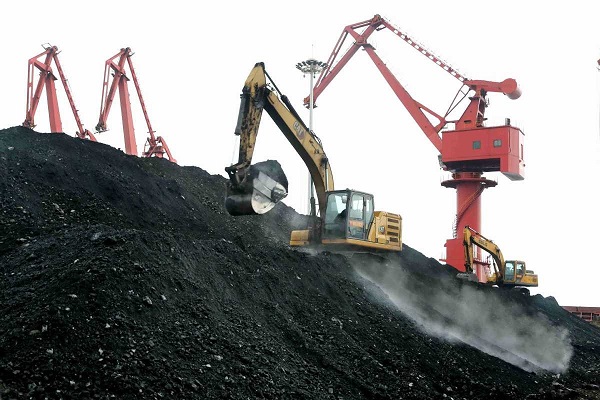China is expected to strengthen efforts to ensure efficient and stable supplies of coal amid surging energy prices on global markets, while pursuing a transition toward the renewable energy-centered, greener energy mix ceaselessly, according to industry experts.

Excavators move coal at a port in Lianyungang, Jiangsu province, on Monday. WANG CHUN/FOR CHINA DAILY
Rich in coal and renewable resources but lacking oil and natural gas reserves, China still needs to rely on domestic coal output to safeguard national energy security. But the nation must replace coal with renewables steadily to safeguard the long-term healthy development of both energy and the overall economy, they said at a recent forum on China's energy development jointly held by China News Service and Energy Foundation China, or EFC.
"China must continue its pursuit of decarbonization, although at present it needs coal to secure energy supply," said Zou Ji, CEO and president of the EFC.
Carbon neutrality cannot be achieved overnight, and it's a test of the nation's wisdom to manage near-term needs and long-term goals, and better balance relations between coal and renewables on the premise of China's specific conditions, he said.
Against the background of high-level global energy prices and inflation, China has boosted efforts to increase domestic coal output to ensure energy supplies and stabilize prices.
In the January-May period, its raw coal output rose 10.4 percent on a yearly basis to 1.81 billion metric tons. Coal imports dropped 13.6 percent to around 96 million tons at the same time, said the National Bureau of Statistics.
Wu Yin, former deputy head of the National Energy Administration, said the nation is taking positive steps in developing nonfossil fuel power.
Wu said China must reduce reliance on external energy supplies. The country is capable of achieving this due to the nation's potential in renewable industries and thanks to its rich solar, wind and ocean energy resources and world-leading position in photovoltaic, wind power, battery and electric vehicle industries.
Zou with the EFC said China must unwaveringly secure efficient coal production and coal-fired electricity generation from existing coal capacities by facilitating policy measures, financial support, and transportation and warehouse guarantees.
However, China also must try its best to meet newly increased energy demand with renewables as much as possible, he said.
He suggested the nation accelerate construction of new non-fossil energy capacities and increase non-fossil power generation in the coming years so that during the 15th Five-Year Plan period (2026-30), it can start gradually replacing existing coal capacity with renewables.
Yuan Jiahai, a professor with the School of Economics and Management at North China Electric Power University in Beijing, suggested China should review the potential risks from its energy strategy centering on "controlling coal, stabilizing oil, increasing natural gas and expanding new energy". The country should also consider the growing complexity in the global geopolitical environment, and turbulence in global energy markets and the nation's current reliance on oil and gas imports.
"Properly increasing coal output in an efficient and stable manner can provide a firm footing for national energy security currently and in the near term," Yuan said.
"We must seek more big progress in new energy development, but new energy cannot take up the role to ensure energy supplies (as coal does) yet," he said.
However, Yuan stressed that with rich energy resources and the most complete new energy industry chain in the world, China in the future will not only meet its own energy security demand with new energy technologies, but could also provide a competent solution for the world to deal with climate change.
Zou said he is confident about China's energy development, because the multiple national agendas, including expanding the economy, ensuring energy supplies, dealing with climate change and revitalizing rural areas, are innately coordinated, and the pursuit of green and low-carbon development could create new investment and demand, thus to inject new impetus into economic growth.(By Liu Zhihua)



